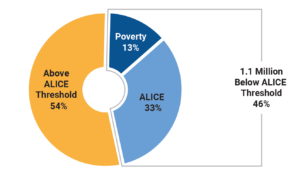The head of a school support staff union illustrates what low-wage life in Florida looks like.
By Johannes Werner
Original Air Date: June 19, 2024
Host: Alice may have been in Wonderland way back when. But today ALICE is a massive and growing presence in Florida. ALICE stands for Asset Limited, Income Constrained, while Employed people. In other words, those households that barely scrape by, living paycheck to paycheck. The folks that can’t seem to get out of the financial hole. The families that fall deeper into the hole when divorce, disease or unemployment strikes. Our news team got its hands on the 2024 update of the annual ALICE report produced by the United Way.
Johannes Werner: First the good news of the 2024 United Way ALICE update: A little more than half of the Florida population still is just fine, thank you. Also, while the number of households living below the poverty line grew slightly during the pandemic, it continues to keep steady around 1 million households for the last 15 years.
Here’s the bad news: The number of those barely scraping by in Florida keeps rising steadily. The total number of ALICE households is approaching 3 million now. That’s up from 2.3 million 15 years ago. It’s about one-third of the state’s total population, a lot of them children.

Florida households as of 2022, by income segment. ALICE families make up one-third, and rising.
How are we doing locally? Both Manatee and Sarasota County are doing better than the state average. In Manatee, 44% of the total population live below the ALICE line. That’s close to 177,000 households. In Sarasota, 40% live below the ALICE line. That’s 215,000 households. That means the pay workers here get is closer to matching the living cost than in most other counties in Florida. However, the numbers in the new ALICE report date back to 2022. Given the explosion of housing costs in this area in 2022 and 2023, that wage-living cost balance may have gotten more out of whack lately. But evidence for that we won’t see until new ALICE data comes out next year.
Another concern: The number and share of workers getting hourly pay and working part time is rising. And that means more fluctuation and uncertainty for those workers.
A lot of people are talking about how rising housing, childcare and transportation costs are to blame. But the elephant in the room is low salaries that are out of touch with living cost.
Nelly Henjes is the head of the Pinellas Educational Support Professionals Association. Her union is active in the Tampa Bay area and represents the “unsung heroes of public education” – the support staffers who keep schools ticking. We are talking about clerical staff, teacher’s assistants, medical assistants. The problems begin with the fact that they are out of work for two months every year, during summer vacation.

Nelly Henjes
Nelly Henjes: It makes it difficult for us because we cannot take unemployment during the summer. Or we cannot go and some other people with a low income cannot go and request food stamps for the summer, because they still have a contract. They’re still working with the district. So they cannot take unemployment. So they make it difficult for them during the summer. They have to find a job for those two months so they can still support their households.
JW: What’s worse, their hourly pay of $15 is nowhere near the subsistence level of $22 that’s needed in the area they work in. Nelly Henjes:
NH: Right now, it’s tough for the employees that live in Pinellas County and the people that we represent. It’s been a struggle because they had to find second and third jobs to survive.
They’re only going to work 70 hours per week [sic]. It’s 35 hours a week. It’s not a full time job like 40 hours. They work 35 hours per week, so that’s every two weeks for 70 hours. And that half of the summer, it makes a big impact because they have to figure out how they’re going to pay the rent, how they’re going to fit the children, how they’re going to pay if the child gets sick … that two months, it’s a struggle.
There are people that are not … that’re rooming with other people because they cannot pay the rent. It is a struggle. A lot of educational support professionals are moving to another county or out of the state so that they can survive; living with their family because they cannot survive here. It’s ridiculous that they’re suffering.
JW: The state legislature just approved money for teacher raises, but there was nothing for support staff. Quite the opposite: The state just passed a law that makes it harder for support staff unions to get recertified.
The union will sit down to bargain with the school district next week. But the district has already signaled it cannot raise hourly pay by more than 3 percent because it doesn’t want to touch its rainy day fund for it. Nelly Henjes argues it’s time to tap the rainy day fund, because for school support staffers it’s not just raining, it’s pouring.
NH: This is a rainy day fund. These people are suffering, they are being homeless, they cannot put food on the table for their children, they cannot pay the rent, they cannot take kids to the hospital. They’re suffering. We’re in a struggle; the employees are in a struggle.
JW: Meanwhile, the number of ALICE households keeps growing.
Reporting for WSLR News, this is Johannes Werner.
WSLR News aims to keep the local community informed with our 1/2 hour local news show, quarterly newspaper and social media feeds. The local news broadcast airs on Wednesdays and Fridays at 6pm.